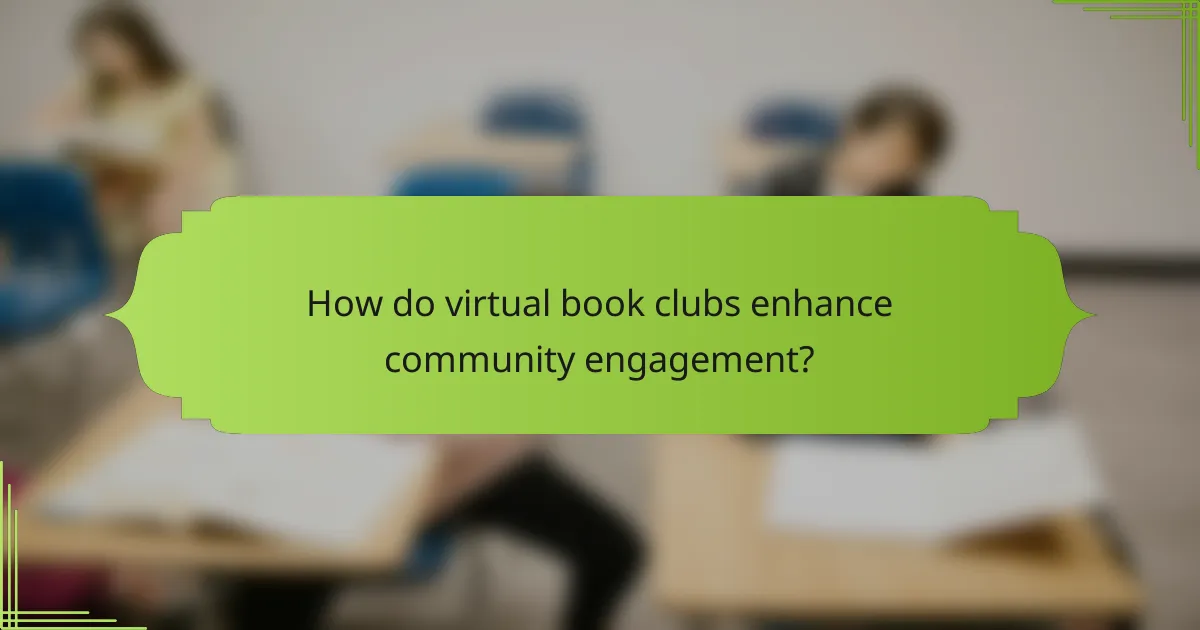Virtual book clubs enhance community engagement by connecting members and facilitating diverse discussions. Popular platforms like Zoom and Goodreads offer unique features to support these interactions. However, challenges such as technology issues and time zone differences can hinder participation. By adapting to member preferences and focusing on inclusivity, virtual book clubs create enriching literary experiences for online communities.

How do virtual book clubs enhance community engagement?
Virtual book clubs significantly enhance community engagement by fostering connections among members, encouraging diverse discussions, and providing accessible literary experiences. These clubs allow participants to share insights and recommendations, creating a sense of belonging. Additionally, virtual settings break geographical barriers, enabling people from different backgrounds to connect over shared interests. This inclusivity enriches conversations and broadens perspectives, ultimately strengthening community ties.
What are the social benefits of participating in virtual book clubs?
Participating in virtual book clubs fosters social connections, enhances communication skills, and promotes cultural exchange. Members engage in discussions that deepen relationships and build a sense of community.
Virtual book clubs allow individuals from diverse backgrounds to share perspectives, enriching the reading experience. This collaborative environment encourages empathy and understanding, crucial for social cohesion.
Moreover, these online platforms provide a unique opportunity for shy or introverted individuals to participate in discussions comfortably. As a result, virtual book clubs can boost confidence in social interactions.
In summary, the social benefits of virtual book clubs include enhanced relationships, improved communication, and increased confidence in social settings.
How do virtual book clubs foster diverse literary discussions?
Virtual book clubs foster diverse literary discussions by connecting members from various backgrounds and perspectives. These platforms encourage participants to share unique interpretations and insights, enriching the conversation. The flexibility of online meetings allows for greater participation, accommodating different schedules and locations. As a result, members can explore a wider range of genres and themes, enhancing the overall literary experience.
Why do members prefer virtual formats over traditional book clubs?
Members prefer virtual formats over traditional book clubs due to flexibility, convenience, and accessibility. Virtual book clubs allow members to participate from anywhere, accommodating diverse schedules. This format fosters inclusivity, enabling individuals who may not attend in-person gatherings to engage in discussions. Additionally, online platforms often provide resources such as discussion guides and author interviews, enhancing the literary experience. The unique attribute of virtual book clubs is their ability to connect members across geographical boundaries, creating a broader community of readers.

What platforms are most popular for hosting virtual book clubs?
The most popular platforms for hosting virtual book clubs include Zoom, Goodreads, Facebook Groups, Discord, and Slack. These platforms offer unique features that enhance community engagement and facilitate discussions.
Zoom enables face-to-face interactions, while Goodreads provides a dedicated space for book tracking and reviews. Facebook Groups fosters community building with easy sharing capabilities. Discord supports real-time chat and voice channels, and Slack offers organized discussions through channels. Each platform serves different preferences, enhancing the virtual book club experience.
Which features make certain platforms more user-friendly?
User-friendly platforms for virtual book clubs often feature intuitive interfaces, seamless navigation, and interactive tools. These elements enhance user engagement and foster community connections.
Key features include:
– **Ease of Use**: Simple design that minimizes learning curves.
– **Discussion Tools**: Integrated chat and video options for real-time interaction.
– **Accessibility**: Compatibility across devices and platforms.
– **Content Organization**: Clear categorization of books and discussions.
– **Customization Options**: Ability to personalize profiles and notifications.
– **Community Building**: Features that promote member interactions and feedback.
How does the choice of platform impact member participation?
The choice of platform significantly impacts member participation by influencing accessibility, engagement, and interaction. Platforms that facilitate easy access, such as user-friendly interfaces and mobile compatibility, encourage higher participation rates. For example, platforms with built-in discussion features foster active engagement among members. Additionally, the social aspects of certain platforms can enhance community building, leading to increased interaction and participation. Ultimately, selecting the right platform aligns with the goals of the virtual book club and the preferences of its members.

What challenges do virtual book clubs face?
Virtual book clubs face challenges like technology issues, time zone differences, and maintaining engagement. These factors can hinder effective communication and participation among members.
Technical difficulties often arise with platform usability, leading to frustration. Additionally, coordinating schedules across various time zones complicates meeting planning. Engaging members in discussions can be difficult without the in-person connection found in traditional book clubs.
How do time zone differences affect participation?
Time zone differences can hinder participation in virtual book clubs by creating scheduling conflicts. Members in varying time zones may struggle to find a common meeting time, leading to decreased engagement. For example, a club with members across the U.S. and Europe may find it challenging to accommodate all participants. As a result, some members may miss discussions or feel excluded, impacting the overall experience. Adapting meeting times or offering recorded sessions can help mitigate these issues, ensuring broader participation.
What technical issues commonly arise during virtual meetings?
Technical issues commonly arising during virtual meetings include connectivity problems, audio and video quality issues, and software compatibility challenges. These can disrupt communication and engagement in virtual book clubs. Connectivity problems often stem from unstable internet connections, leading to lag or disconnections. Audio and video quality issues can result from poor hardware or bandwidth limitations, affecting participants’ ability to hear and see each other clearly. Software compatibility challenges may occur when participants use different platforms or outdated versions, complicating the meeting experience. Addressing these technical issues enhances the overall effectiveness of virtual literary discussions.
How can moderators effectively manage discussions online?
Moderators can effectively manage discussions online by establishing clear guidelines, fostering inclusivity, and actively engaging participants. They should set expectations for behavior and topic relevance to maintain a focused environment.
Encouraging diverse perspectives enhances the discussion, while timely interventions can address conflicts or misinformation. Utilizing tools like polls or Q&A sessions can promote interaction and keep conversations dynamic.
Regular feedback from participants helps moderators refine their approach, ensuring a positive experience for all members. By adapting strategies based on group dynamics, moderators can enhance the overall literary experience in virtual book clubs.

What unique themes or genres are explored in virtual book clubs?
Virtual book clubs explore diverse themes and genres, enhancing literary experiences for online communities. Popular genres include contemporary fiction, mystery, and historical novels, appealing to a broad audience. Unique themes often focus on social issues, personal growth, and cultural exploration, fostering meaningful discussions among members. Additionally, rare genres like speculative fiction and graphic novels are gaining traction, attracting niche audiences seeking innovative storytelling.
Which genres see the highest engagement in virtual settings?
Fiction genres see the highest engagement in virtual book clubs. Readers are drawn to contemporary fiction, mystery, and fantasy, which foster discussions and allow for varied interpretations. Non-fiction genres, like memoirs and self-help, also engage participants, but to a lesser extent. Popularity in these genres can be attributed to their relatable themes and emotional depth, encouraging active participation and connection among members.
How do themed book selections enhance the reading experience?
Themed book selections significantly enhance the reading experience by fostering deeper connections among participants. They create common ground, encouraging discussions that delve into shared themes and ideas. This approach enriches engagement, as readers explore diverse perspectives within a unified context. Additionally, themed selections can introduce readers to genres or authors they might not have considered, broadening their literary horizons.

How do virtual book clubs adapt to member preferences?
Virtual book clubs adapt to member preferences by incorporating flexible scheduling, diverse reading selections, and interactive discussions. They use surveys to gauge interests and adjust their formats accordingly. This ensures all members feel engaged and valued. Some clubs may also offer themed events or author Q&A sessions to enhance the experience.
What feedback mechanisms are effective for improving member satisfaction?
Effective feedback mechanisms for improving member satisfaction in virtual book clubs include surveys, discussion forums, and regular check-ins. Surveys provide quantitative data on member preferences and experiences. Discussion forums foster open dialogue, allowing members to express thoughts and suggestions. Regular check-ins create a personal connection, encouraging members to share feedback directly. These methods enhance engagement and ensure that the book club evolves to meet member needs.
How can clubs integrate multimedia resources to enrich discussions?
Clubs can integrate multimedia resources by using videos, podcasts, and interactive tools to enhance literary discussions. These resources stimulate engagement and deepen understanding of themes. For example, incorporating author interviews or film adaptations can provide diverse perspectives. Utilizing platforms for shared annotations or live discussions fosters community interaction and enriches the overall reading experience.

What are the best practices for running a successful virtual book club?
To run a successful virtual book club, prioritize engagement, structure, and inclusivity. Establish a clear schedule and choose diverse book selections to cater to varied tastes.
1. Set a regular meeting schedule to create consistency.
2. Use video conferencing tools to enhance interaction.
3. Create discussion prompts to guide conversations.
4. Encourage participation from all members to foster inclusivity.
5. Utilize social media or group chats for ongoing discussions.
6. Consider themed meetings to keep interest high.
What tips can enhance member interaction and retention?
To enhance member interaction and retention in virtual book clubs, foster a sense of community and engagement. Encourage regular discussions and create themed events to maintain interest.
Utilize interactive tools like polls and quizzes to involve members actively. Schedule consistent meetings to establish routine and familiarity. Personalize communication to make members feel valued and recognized.
Incorporate diverse reading selections to cater to varied interests, ensuring that all members find something appealing. Offer incentives for participation, such as recognition or small rewards, to motivate ongoing involvement.
Which common mistakes should be avoided in virtual book club management?
To effectively manage a virtual book club, avoid common mistakes like poor communication, lack of engagement, and unclear guidelines. Establish clear expectations and foster interaction among members.
1. Neglecting member input can lead to disengagement.
2. Failing to set a schedule results in disorganization.
3. Ignoring technology issues may disrupt meetings.
4. Overloading discussions with too many topics can confuse participants.
5. Not providing a platform for feedback prevents improvement.
How can clubs celebrate literary milestones and achievements effectively?
Clubs can celebrate literary milestones and achievements effectively by hosting engaging virtual events. These can include author Q&A sessions, themed discussions, or milestone reading challenges that encourage participation.
Utilizing social media platforms enhances visibility and community engagement. For instance, clubs can create hashtags to track discussions and share achievements.
Incorporating multimedia elements, such as video readings or interactive polls, adds variety and keeps members engaged. This approach fosters a sense of community and shared accomplishment among members.
Recognizing individual contributions or milestones within the club can also motivate members. Celebrations can include virtual awards or shout-outs during meetings, reinforcing a supportive environment.